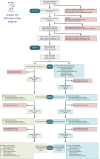Preventing substance misuse: study protocol for a randomised controlled trial of the Strengthening Families Programme 10-14 UK (SFP 10-14 UK)
- PMID: 24438460
- PMCID: PMC3902023
- DOI: 10.1186/1471-2458-14-49
Preventing substance misuse: study protocol for a randomised controlled trial of the Strengthening Families Programme 10-14 UK (SFP 10-14 UK)
Abstract
Background: Prevention of alcohol, drug and tobacco misuse by young people is a key public health priority. There is a need to develop the evidence base through rigorous evaluations of innovative approaches to substance misuse prevention. The Strengthening Families Programme 10-14 is a universal family-based alcohol, drugs and tobacco prevention programme, which has achieved promising results in US trials, and which now requires cross-cultural assessment. This paper therefore describes the protocol for a randomised controlled trial of the UK version of the Strengthening Families Programme 10-14 (SFP 10-14 UK).
Methods/design: The trial comprises a pragmatic cluster randomised controlled effectiveness trial with families as the unit of randomisation, with embedded process and economic evaluations. Participating families will be randomised to one of two treatment groups - usual care with full access to existing services (control group), or usual care plus SFP 10-14 UK (intervention group). The trial has two primary outcomes - the number of occasions that young people report having drunk alcohol in the last 30 days, and drunkenness during the last 30 days, both dichotomised as 'never' and '1-2 times or more'. The main follow-up is at 2 years past baseline, and short-term and intermediate outcomes are also measured at 9 and 15 months.
Discussion: The results from this trial will provide evidence on the effectiveness and cost-effectiveness of an innovative universal family-based substance misuse prevention programme in a UK context.
Trial registration: Current Controlled Trials ISRCTN63550893.
Similar articles
-
Effectiveness of the Strengthening Families Programme in the UK at preventing substance misuse in 10-14 year-olds: a pragmatic randomised controlled trial.BMJ Open. 2022 Feb 21;12(2):e049647. doi: 10.1136/bmjopen-2021-049647. BMJ Open. 2022. PMID: 35190414 Free PMC article. Clinical Trial.
-
Youth social behaviour and network therapy (Y-SBNT): adaptation of a family and social network intervention for young people who misuse alcohol and drugs - a randomised controlled feasibility trial.Health Technol Assess. 2017 Mar;21(15):1-260. doi: 10.3310/hta21150. Health Technol Assess. 2017. PMID: 28399988 Free PMC article. Clinical Trial.
-
Prevention of alcohol misuse among children, youths and young adults.GMS Health Technol Assess. 2011;7:Doc04. doi: 10.3205/hta000095. Epub 2011 Jul 22. GMS Health Technol Assess. 2011. PMID: 21808659 Free PMC article.
-
Folic acid supplementation and malaria susceptibility and severity among people taking antifolate antimalarial drugs in endemic areas.Cochrane Database Syst Rev. 2022 Feb 1;2(2022):CD014217. doi: 10.1002/14651858.CD014217. Cochrane Database Syst Rev. 2022. PMID: 36321557 Free PMC article.
-
Community Occupational Therapy in Dementia intervention for people with mild to moderate dementia and their family carers in the UK: the VALID research programme including RCT.Southampton (UK): National Institute for Health and Care Research; 2023 Jun. Southampton (UK): National Institute for Health and Care Research; 2023 Jun. PMID: 37463269 Free Books & Documents. Review.
Cited by
-
Qualitative Comparative Analysis: A Mixed-Method Tool for Complex Implementation Questions.J Prim Prev. 2019 Feb;40(1):69-87. doi: 10.1007/s10935-019-00536-5. J Prim Prev. 2019. PMID: 30671752
-
An application of Extended Normalisation Process Theory in a randomised controlled trial of a complex social intervention: Process evaluation of the Strengthening Families Programme (10-14) in Wales, UK.SSM Popul Health. 2017 Dec;3:255-265. doi: 10.1016/j.ssmph.2017.01.002. SSM Popul Health. 2017. PMID: 29302612 Free PMC article.
-
Effectiveness of the Strengthening Families Programme in the UK at preventing substance misuse in 10-14 year-olds: a pragmatic randomised controlled trial.BMJ Open. 2022 Feb 21;12(2):e049647. doi: 10.1136/bmjopen-2021-049647. BMJ Open. 2022. PMID: 35190414 Free PMC article. Clinical Trial.
-
Family-based prevention programmes for alcohol use in young people.Cochrane Database Syst Rev. 2019 Mar 19;3(3):CD012287. doi: 10.1002/14651858.CD012287.pub2. Cochrane Database Syst Rev. 2019. PMID: 30888061 Free PMC article.
-
Cultural adaptation and intervention integrity: a response to Skärstrand, Sundell and Andréasson.Eur J Public Health. 2014 Jun;24(3):354-5. doi: 10.1093/eurpub/cku039. Epub 2014 Apr 9. Eur J Public Health. 2014. PMID: 24723690 Free PMC article. No abstract available.
References
-
- Ezzati M, Vander Hoorn S, Lopez AD, Danaei D, Rodgers A, Mathers CD, Murray CJL. In: Global Burden of Disease and Risk Factors. Lopez AD, Mathers CD, Ezzati M, Jamison DT, Murray CJL, editor. Washington DC: The World Bank / Oxford University Press; 2006. Comparative quantification of mortality and burden of disease attributable to selected risk factors; pp. 241–396. - PubMed
-
- World Health Organisation. Evidence-based strategies and interventions to reduce alcohol-related harm: global assessment of public-health problems caused by harmful use of alcohol. 2007.
-
- Currie C, Zanotti C, Morgan A, Currie D, de Looze M, Roberts C, Samdal O, Smith ORF, Barnekow V. Health Policy for Children and Adolescents. Copenhagen: WHO Regional Office for Europe; 2012. Social determinants of Health and Well-Being among Young People. Health Behaviour in School-Aged Children (HBSC) Study: International Report from the 2009/2010 Survey.
Publication types
MeSH terms
Grants and funding
LinkOut - more resources
Full Text Sources
Other Literature Sources
Medical
Miscellaneous


